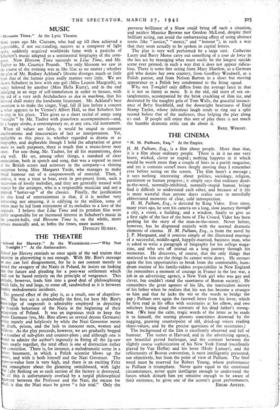MUSIC Blossom Time." At the Lyric Theatre.
SOME years ago Mr. Clutsam, who had up till then achieved a respectable, if not ou:standing, success as a composer of light opera, suddenly acquired worldwide fame with a pastiche of Schubert s music adapted to a sentimental biography of the com- poser. Now Blossom Time succeeds to Lilac Time, and Mr. Tauber to Mr. Courtice Pounds. The only blossom we saw in the course of the evening was as like lilac as no matter ; whether the plot of Mr. Rodney Ackland's libretto diverges much or little from that of the former piece really matters very little. We are shown Schubert in love with one girl (Miss Leueen Macgrath), as vainly beloved by another (Miss Hella Kurty), and in the end indulging in an orgy of self-immolation in order to- 'ensure, with the aid of a very arch Archduchess as dea in machina, that his beloved shall marry the handsome lieutenant. Mr. Addend's best invention is to make the singer, Vogl, fall ill just before a concert in what appears to be Vienna's Albert Hall, so that Schubert has to sing in his place. This gives us a short recital of songs sung "straight" by Mr. Tauber with pianoforte accompaniment—and, by a happy stroke, a contemporary or, at any rate, old instrument. When all values are false, it would be stupid to censure anachronisms and inaccuracies of fact or interpretation. Yet, negligible as this piece is, whether regarded as drama or as biography, and deplorable though I hold the adaptation of great music to such purposes, there is much that a music-lover may enjoy. For one thing, Mr. Tauber, for all his mannerisms, does sing well. He set, among other things, a standard of clear enunciation, both in speech and song, that was a reproof to most of the British actors and actresses in the company—a shining exception being Miss Margaret Yarde, who manages to make broad humour out of a couponsworth of material. Then, I confess, it was a treat to hear, even in pot-pourri form, such a succession of lovely melodies, and they are generally treated with respect by the arranger, who is a responsible musician and not a negroid " hotter-up " of the classics. Finally, the justification for this kind of entertainment is that, if it is neither very mteresting nor amusing, it is edifying to the million, some of whom may be led from enjoyment of its melodies to a love of the originals. I believe that Lilac Time and its pendant film were partly responsible for an increased interest in Schubert's music in the concert-halls, and Blossom Time is, on the whole, more serious musically and, as .befits the times, more austere.
DYNELEY HUSSEY.


























 Previous page
Previous page